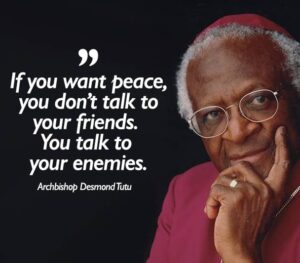A blog by Frits Koster and Joyce Cordus
On Oct. 7, 2023, violence escalated in the Middle East when Hamas fired rockets at Israel and launched an unprecedented operation in southern Israel, deliberately killing, injuring, raping and kidnapping civilians. This brought a huge shock to the world, similar to the impact of the attack on the Twin Towers in New York on Sept. 11, 2001. Israel answered and is now still answering this violence with an operation intended to eliminate all Hamas fighters in the Gaza Strip; in the process, more than 35,000 (update August 2024: almost 40,000) Palestinian civilians are now believed to have been killed and a huge number of wounded as “collateral damage . One speaks of a serious humanitarian crisis in the Gaza Strip.
The problem appears to be deep and involves a struggle between different peoples, where it is very difficult to pinpoint a specific group as responsible for all the misery. It is therefore incredibly difficult or even impossible for outsiders – such as the authors of this blog – to answer a so-called “guilt question”. In this context, it may not be necessary at all.
For one thing is certain. The current spiral of violence in the Middle East and the suffering it brings are not likely to end simply by continuing to use violence as a tool. It will not bring lasting peace.
 The value of talking
The value of talking
To forgive each other is probably far too high a goal now, and we realize that few people will listen to us. Nevertheless, we think it makes sense in this blog to ask or perhaps implore all parties: ‘Please stop the violence and start and keep talking to each other’. Every day that no violence takes place is already valuable. This requires a certain courage, namely the courage to get over feelings of resentment and beliefs that have become hard. Desmond Tutu, who was awarded the Nobel Peace Prize in 1984, put it this way: “If you want peace, you don’t talk to your friends. You talk to your enemies.” Fortunately, there are examples in world history where this has worked out very valuable in the end in a difficult conflict situation. Look at South Africa and Northern Ireland, for example.
Of course, this attitude of “don’t feed and indulge resentment further” applies just as much to conflicts closer to home, for example, at work, in the family or in our circle of friends. As the Dalai Lama states, ‘Love and compassion are necessities, not luxuries. Without them, humanity cannot survive.’
– Frits Koster and Joyce Cordus, December 2023

